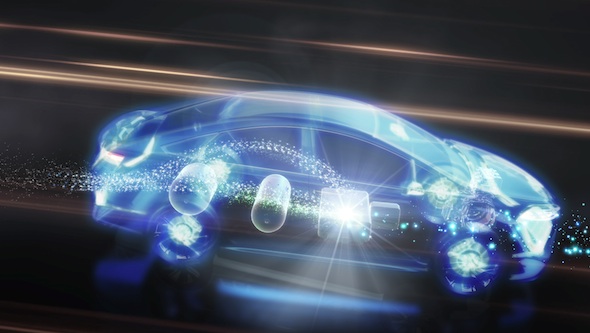
Toyota is on course to launch its first hydrogen fuel cell vehicle in 2015 and will reveal the latest details on its next-generation hybrid technology at the Frankfurt motor show in September.
Toyota believes the Fuel Cell Hybrid Vehicle offers the best solution to the challenges of energy sources and emissions, with hydrogen as an ideal, ultra-clean fuel.
On Tuesday September 10th 2013, Toyota will demonstrate how it has overcome some of the historic barriers to developing a marketable fuel cell vehicle and how it is closing in on its goal of achieving a driving range and performance comparable to conventional petrol and diesel engines, but with no harmful tailpipe emissions.
Toyota applied its successful Hybrid Synergy Drive technology – the power system used by Prius and its other full hybrid production models – in its FCHV development, replacing the petrol engine with a fuel cell and the conventional fuel tank with high-pressure hydrogen tanks. The FCHV uses the same electrical components as a full hybrid powertrain, as well as a 21kW battery to store energy recovered by its regenerative braking system.
The FCV-R concept was first unveiled at the 2011 Tokyo motor show, and since then Toyota has continued to make progress towards its planned introduction of an affordable FCHV saloon model in Japan, the USA and Europe by 2015. Development of the production model has seen a focus on significant cost reduction, durability, reliability and improvements in well-to-wheel CO2 emissions.
Tests have seen the FCV-R concept achieve a maximum driving range of about 420 miles (in the Japanese JC08 cycle), producing no CO2, NOx or particulate matter emissions – the only by-product of the hydrogen fuel cell when driving is water vapour.
Engineers have managed to reduce the size of the fuel cell stack by achieving the highest fuel cell power density yet – 3.0kW per litre. A marked increase in energy efficiency has allowed for the size of the vehicle’s fuel tank to be reduced, so that the latest design features two tanks rather than the four originally envisaged. This also allows different materials to be used, which has a positive impact on overall costs.
The twin fuel tanks and the fuel cell stack are located beneath the vehicle floor, meaning there is no impact on the cabin and load space.
Toyota expects FCHVs to reach full mass-market commercialisation during the 2020s, by when it aims to be selling tens of thousands of vehicles each year. This market growth will be supported by the wider roll-out of fuel cell vehicle technology; the development of hydrogen refuelling infrastructure that will bring filling stations within easy reach of greater numbers of people; and cost reductions that go hand-in-hand with a maturing technology.
Fuel cell development
Toyota’s fuel cell stack technology has consistently enjoyed performance leadership ever since the company launched its R&D programme in 1992. Since then it has secured significant improvements in every aspect of FCHV operation.
As mentioned above, the fuel cell to be used in Toyota’s production FCHV currently achieves the world’s highest power output density at 3.0kW per litre. Compared to the fuel stack Toyota deployed in its 2008 FCHV-adv model, the new unit has twice the power density while being half the weight and half the size.
The leap in energy efficiency is also revealed in the vehicle’s range in everyday driving, which, test data (in line with the official Japanese 10-15 test cycle), has improved from about 205 miles to more than 350 miles. At the same time, the fuel cell has a greater operating range, with the use of new materials in its construction making cold start possible at temperatures as low as -30°C.
Cost issues have also been tackled with the current fuel cell system, including the stack and high-pressure hydrogen tank, one-tenth the cost of that used in the FCHV-adv. Toyota aims ultimately to reduce this by a further 50 per cent. Currently a vehicle price tag of less than £70,000 is thought attainable, but Toyota is working to reduce costs even further before bringing its first model to market.
Toyota’s presentation on its FCHV programme at the Frankfurt motor show forms part of a wider focus on the development and future prospects for its hybrid power technology.
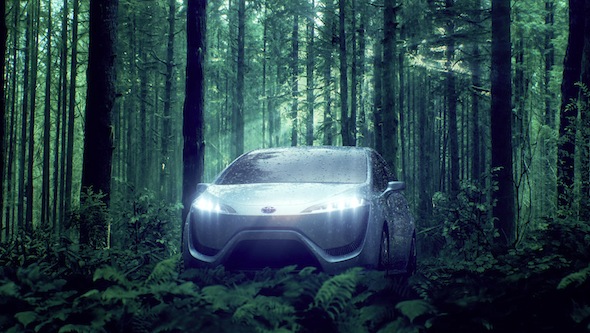
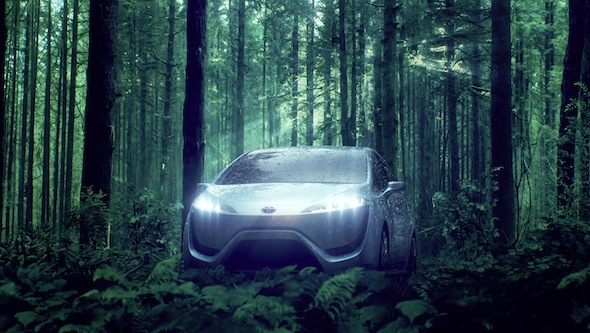
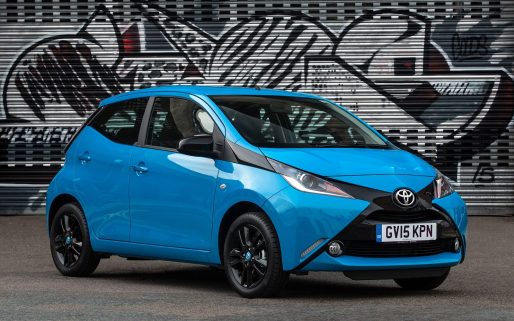


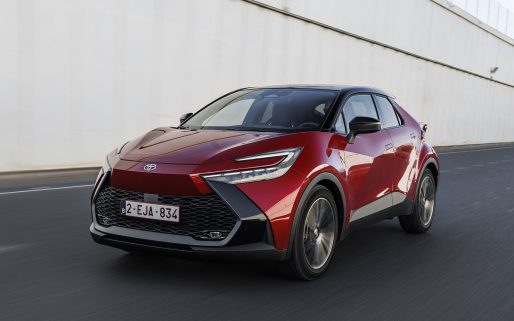
future technologies that are part of the Toyota, I love the green world
Now that IS what Toyota is about..
why don’t they use the braking system to produce hydrogen by using the energy produced by braking to power electromagnets.
Hi Chris
Thanks for your post and interesting comment.
We currently use the energy obtained from braking to help charge batteries and then use this electricity to drive a vehicle wheels at lower speed, making a car more efficient. This is how our hybrid technology works today which we know is tried and tested and saves the use of fuel when in traffic for example . Whether the technology could be developed to manufacture hydrogen from braking remains to be seen but adapting our current hybrid technology which is modular and future proof makes the most sense. That said I am sure that all aspects of recharging will be examined as we look to develop this technology in the future and all possible options to help develop the ultimate eco car.
Hope this helps.
Toyota stated in August that their fuel cell power output density at 3kW/litre is the highest achieved for the auto industry.
However, in March, earlier this year a British Company which is working with Suzuki and several other auto companies announced that their proprietary and patented fuel cells produce continuous volumetric power density of 3.7kW/litre, some 23% higher than Toyota’s claim. The British also say they have much more still to come from improvements in the pipeline. Their fuel cell technology is also believed to be much lighter in weight than their competitors developments and also facilitates cold starting by utilising proprietary cooling processes for the fuel cell stack.
Does this translate into 23% greater range and/or engine performance for an equivalent sized fuel cell stack, and/or fuel tank?
Hi John
Thanks for the post.
I will need to check this with our European HQ and will reply as soon as I can.
Best wishes.
Hi John
Thanks again for your post and have found out a bit more about this for you.
Our claim about having the highest fuel cell stack power density (of 3 kW per litre) is based on our understanding of original equipment manufacturer work in this area and fuel cell cars that we know currently exist. We have – at the moment – the higher power density from these vehicles. We did not see a fuel cell car from Suzuki with a fuel stack when we undertook this review but if you know otherwise please let us know. I am sure though, that the way in which this technology is developing that all will be hoping fuel cell stack density output will continue to be improved in terms of vehicle efficiency. Hope this helps.
I’m all for any car company that is trying to get us off the petroleum habit. The first company to come out with a hydrogen fuel cell crossover that seats 7 will most likely get my money.
Thanks for your feedback on this post Don, it is interesting to receive such comments regarding future technologies.
Is it possible for Toyota to develop a hydrogen home generator that would be inexpensive and small enough to fit in your garage? If they could, it would seem that would at least temporarily help with the lack of hydrogen fueling stations. People could fuel up at home and they would not need more fuel unless traveling long distances.
Hi Richard
Thanks for your post and good to hear your thoughts about hydrogen.
Without doubt the manufacture and distribution of hydrogen will present challenges in the future. This is why we have teamed up with other companies as part of the H2 Mobility Project to address these issues sooner rather than later as we look to introduce hydrogen vehicles in the future. More information about this project can be found here http://www.ukh2mobility.co.uk/.
As Toyota we are more involved with the development of hydrogen vehicles rather than the infrastructure required, that said our involvement with this project does mean that all parties do need to work together to help make this a reality.
Hope this helps.
What is most exciting here and the point of the development is to manufacture fuel cells which do not require rare metals and can be mass produced in a cost effective way.
The question posed about an individual creating their own hydrogen fuel is actually the easy part of this equation . Electrolysis and the disaccociation of oxygen from H20 can be accomplished in a DYI format safely and cost effectively at the individuals residence. .
Also can be generated from energy alternatives so the argument about fossil fuels is not the only resource behind hydrogen generation. In addition other stationary fuel cell tecnology for converting natural gas to hydrogen sequestering C02 is now available to home owners.
Storage issues are also being resolved using less expensive alternatives to liquefy hydrogen at ambient atmospheric pressure as apposed to the 5,000psi necessary for hydrogen liquification in the previous containment options. (Ie) graphite created from capillary organic resources can be chemically and thermally reduced to create cheep carbon nano tubes wich in turn allow hydrogen gas to condensate on the nano carbon substrate without the necessity for high pressurization.
The material science involved in catalyst research can also benifit the above mentioned applications and can be applied to every aspect of the water – hydrogen cycle
Solar,batteries,fuel cells, super capacitors,storage.
Removing carbon from the hydrocarbon fuels and implementing carbon as the mechanical catalist is the obvious solution because carbon is the binder that allows hydrogen to be liquid at ambient pressure and high energy densities .
Graphene manufacturing will eventually be the magic substance for this revolution to become possible.